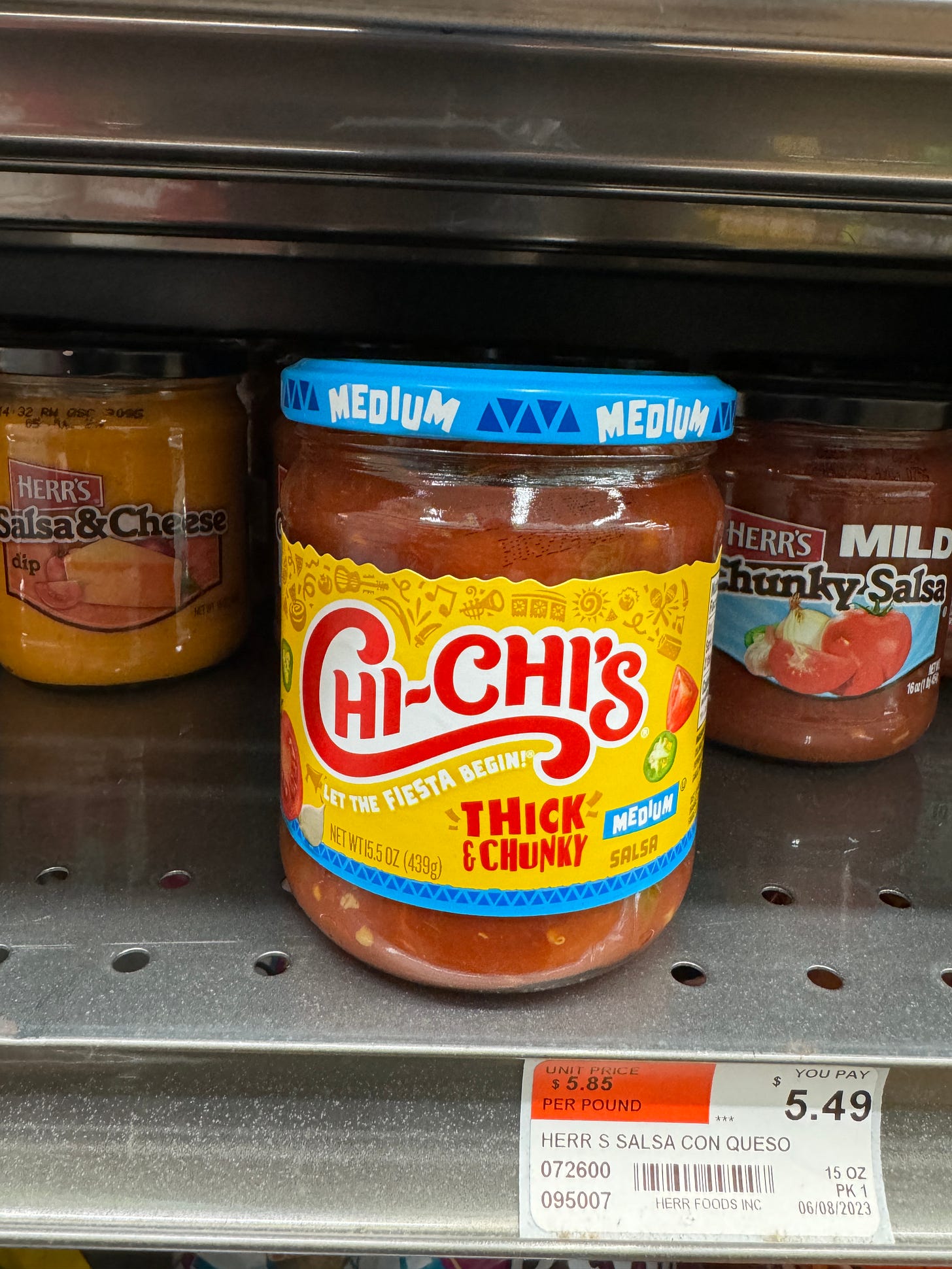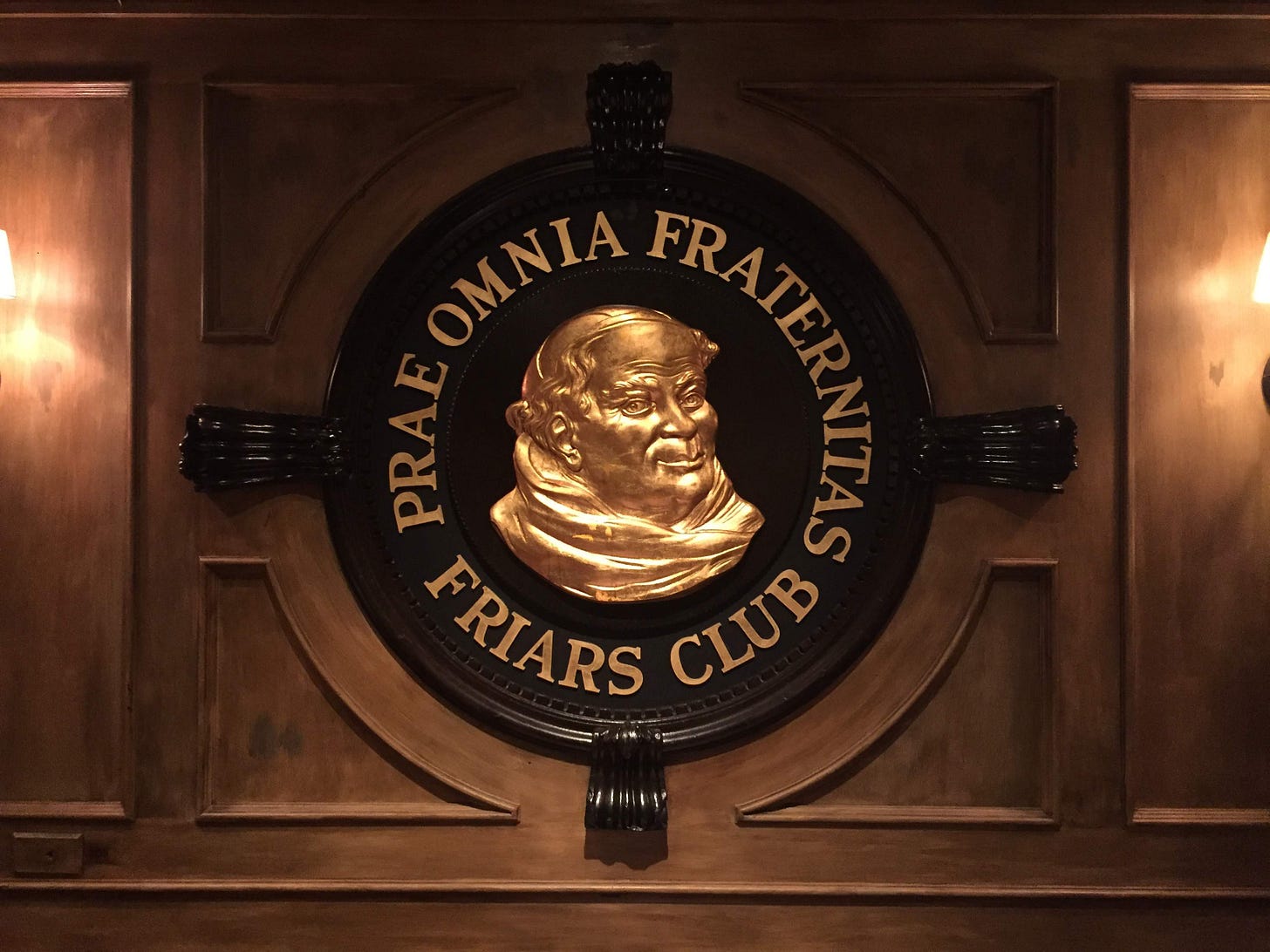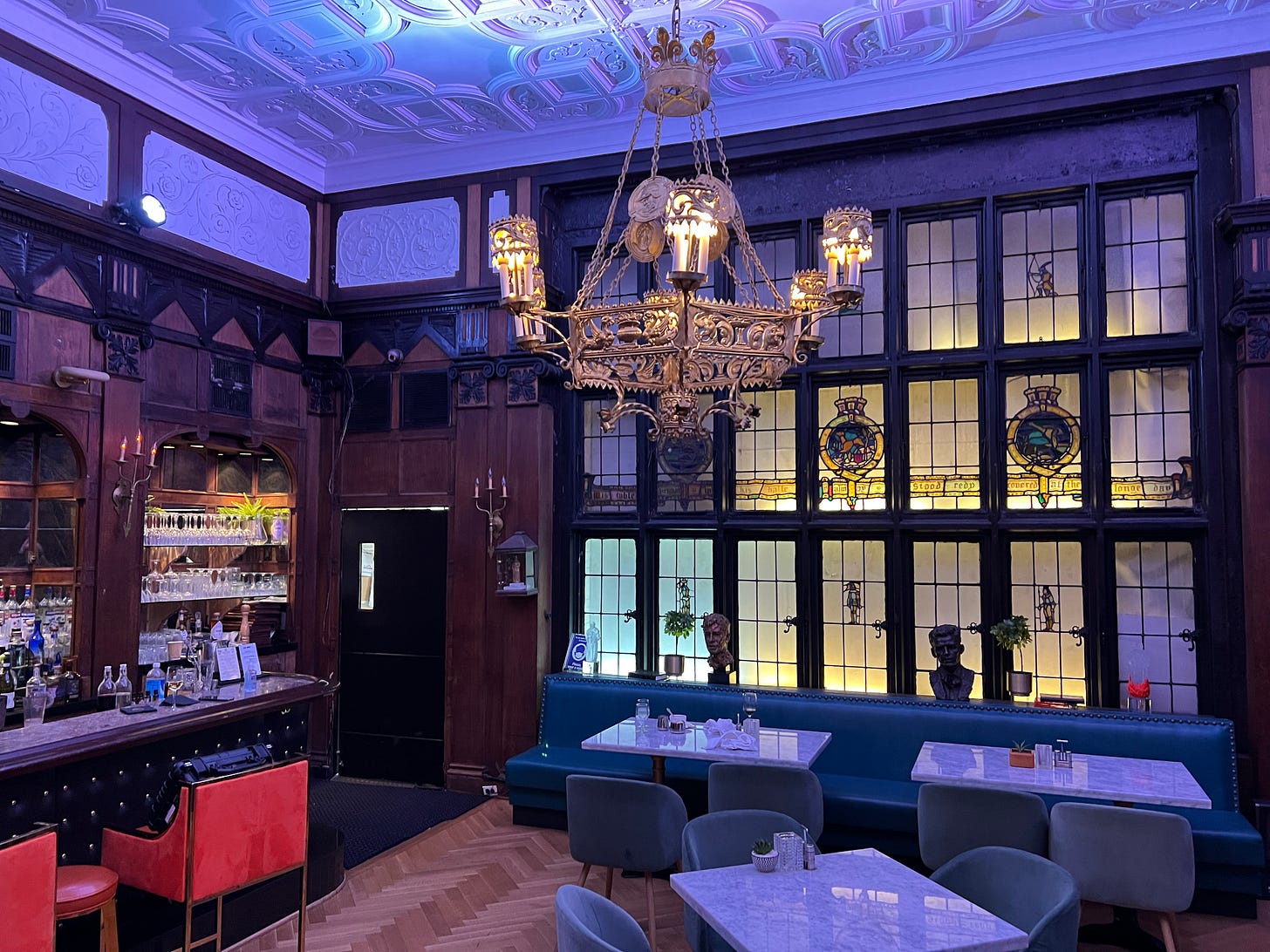Chi-Chi's comeback? NYC's Absolute Bagels closes. Note of hope for Phoenix's Ziggie's sign. Woolworth's Bakersfield renovation update | Retrologist Roundup
Plus, a sad ending for NYC's Friars Club and other headlines from The Retrologist
Music to our ears — and eyes
Ziggie’s, the iconic music shop in Phoenix, Arizona, closed earlier this year due to the health problems of its owner, Dionne Hauke, the daughter of founder, the accordionist Angelo “Ziggie” Zardus. While the 1950s-era building's future remains uncertain, the sign, designed like a musical note, will be cared for by the Mesa Preservation Foundation and is currently being evaluated by a local sign shop. (It was restored a decade ago.) The foundation’s Neon Garden at The Post, which has a collection of several notable local signs, is set to open next year.
I photographed Ziggie’s back in 2018. Here’s more on the shop’s history.

Can Chi-Chi’s make a comeback?
Chi-Chi’s, the once popular chain of Mexican restaurants, imploded in North America 20 years ago after a deadly hepatitis A outbreak, tied to green onions in its salsa that sickened hundreds of customers and left at least four dead. It was an ignominious end to a chain that started in 1976 outside Minneapolis and had become an American dining fixture. (Quick aside: Chi-Chi’s muddled along in Europe, and the last outpost survived in Vienna, Austria, until this year. Resilient remnants of once large chains are a perpetual source of intrigue for me.)
Hormel Foods, keeper of the Chi-Chi’s trademark these days, continues to sell salsa and other products under the brand, and now, the food giant is reportedly allowing Michael McDermott, the son of the chain’s co-founder, Marno McDermott, to open new stores under the Chi-Chi’s brand. McDermott is no dilettante — he founded and sold Kona Grill, and CNN reports he hopes to revive Chi-Chi’s brick-and-mortar business in 2025, eventually with over 200 stores, a retail reach similar to the original chain.
That would be quite a comeback. Nostalgia sells, and while some old-school chains have struggled despite their legacy (Red Lobster, for example), a new Chi-Chi’s might be able to capitalize on fondness for simpler times. R.J. Hottovy, head of analytical research at Placer.ai, told CNN: “Strategies like reintroducing beloved menu items or offering exclusive collector’s items have resonated with consumers, suggesting these tactics could also work well for reviving these classic brands.”
Grimace Shakes are one thing; reviving a chain whose name was tarnished into storefront oblivion is quite another. But nostalgia can remarkably snip out the unpleasant bits of the past. A whole generation of Americans is around for whom Chi-Chi’s would be a novelty, a potentially intriguing retro phenomenon for young people obsessed with vintage, particularly the 1990s, when Chi-Chi’s, despite financial travails, was still a force. (I visited my first Chi-Chi’s in suburban Philadelphia in May 1995.)
What do you think about a Chi-Chi’s revival? Comment as you see fit below.
An ‘Absolute’ loss
The loss of an iconic bagel shop hits like a death for New Yorkers, and folks, myself included, are reeling from the unexpected demise Thursday of Absolute Bagels in the Morningside Heights neighborhood of Manhattan.
The closure of the store, which opened in 1992, came as an absolute shock. They were open as recently as Wednesday, and the next day, a teary worker was giving away bagels and offering no explanation for why the shop closed. I went to college at Columbia in the 1990s, and Absolute was a favorite, along with the long-shuttered Columbia Bagels, so my ties to Absolute run deep.
If the intimidating lines snaking along Broadway on weekends could serve as a reliable measure of financial vitality, Absolute would still be doing a healthy business. The shop's founder, Samak Thongkrieng, learned the ropes at Ess-a-Bagel, which is very much still around. The Times tried to reach him but was unsuccessful. The West Side Rag broke the story.
Later on Friday came word that, on Dec. 11, the bagel shop had spectacularly failed a health department inspection. The findings are not for the squeamish.
No laughing matter
It’s the end of an era: New York’s Friars Club, where the who’s who of American comedy once yucked it up and diverted themselves, was sold at foreclosure for $17.2 million. I attended a handful of events here (alas, never one of the legendary roasts) and even dined here with a dear friend who was a club member. That meal was just a few months before the club closed for good.
This is a very sad end to an American entertainment institution.
Per the Times:
The auction capped the yearslong decline of the storied comedy institution that had been a main haunt for the likes of Frank Sinatra, Ed Sullivan and Milton Berle. Hobbled by a flood and the pandemic, the club started missing payments on its $13 million mortgage last year, and the loan company moved to foreclose.
… Because the exterior of the building has landmark status, the club cannot be torn down to make room for another of the glassy skyscrapers in its vicinity. But the buyer has full control over the interior, which includes rooms named after Barbra Streisand and Joe E. Lewis, a dining room known as The Monastery, offices and a fitness center.
The sale to a creditor has left club members with a glimmer of hope. They dream that a plan to buy it back and reopen the club at its historic location can materialize even at this late date. The sale includes everything inside —and that’s a lot of history that I pray does not get dispersed or lost.

Notes From The Road
Lucy the Elephant of Margate City, New Jersey, reminds us that she is older than the Brooklyn Bridge by two years, the Statue of Liberty by five, and the Eiffel Tower by eight. She is such a delight, and she is billed as America’s oldest roadside attraction.
The Tower of the Americas, the San Antonio observation deck/restaurant complex constructed for HemisFair ‘68, aka the 1968 World’s Fair, will receive a $20 million refresh.
Years ago, during Open House New York, I had a chance to tour architect Paul Rudolph’s famous Modulightor Building in Manhattan’s Midtown East. The structure is landmarked on the outside, and now, New York City is poised to extend the same protection to its interior.
A long-neglected gem in Newark, the RKO Proctor’s Theatre building that was once a Vaudeville playhouse, is set to be renovated into apartments. Those would go in the structure’s tower, but the theater itself, on a separate lot, may still face a date with destruction,
Update: The old Woolworth’s in downtown Bakersfield, California, is on target to reopen by this summer. In the years since the Woolworth’s chain closed, the structure, which turns 75 next year, served as an antique mall with its historic luncheonette still open as a working restaurant. The building is now owned by Moneywise, a local financial-services company that will house its headquarters here while also transforming the building into a music venue, a music education center, a recording studio, and, yes, like in the old days, a lunch counter.
I've been following the saga of Norms La Cienega. Fast-growing chicken-finger chain Raising Cane’s proposed opening a restaurant in the historic Googie structure and modifying the signage. After a public and preservationist backlash, Raising Cane’s, which owns the property, withdrew its plans.
Denver has designated 36 historic stores, including Bonnie Brae Ice Cream, as legacy businesses. I visited some of these on a book research trip earlier this fall. Congratulations to all for this well-deserved honor!
A fresh attempt is afoot to revive the Star Theatre in Brooklyn, Michigan. The theater has been closed since 1986.
In an era of LED conversions and sign dismantlings and disappearances, it’s always nice to see the installation of a new neon sign. The folks in downtown Lorain, Ohio, will get to enjoy the warm glow from the new neon for Lorenzo’s Pizzeria, a longtime Oberlin-based restaurant that opened this new location in downtown Lorain a few years ago. The fascia sign is not too shabby, either. Neon was selected as a nod to the former prevalence of neon signs on its home street of Broadway.
And more new signs, this one in Tucson, Arizona, heralding the Miracle Mile Historic District. The signs mark an area that was once "a vital automobile gateway into Tucson” before the arrival of Interstate 10 here in 1958.
The Roxy, a Quonset-hut theater in Coleman, Alberta, Canada, from 1948, is being restored, from the neon to the messed-up interior. Check out the article for a beautiful picture of the theater, including a Pepsi-Cola mural sign.
Salt Lake City’s Union Pacific Depot has reopened as a new hotel, the Asher Adams.
Know a building in Illinois that is endangered? Landmarks Illinois wants to hear from you for its 2025 list of Most Endangered Historic Places in Illinois. The deadline is Jan. 10 to submit nominees.
Around $90 million in renovations are almost complete at the Carolina Theatre in Charlotte, North Carolina.
Omaha’s Rathskeller Beir Haus will reopen Jan. 10 under new ownership.
Atlas Obscura takes us to the ship-shaped (if not so “ship shape” these days) S.S. Blinky Jr. building in Casa Grande, Arizona, which I missed on a visit there last month.
Finally, if you’re anywhere near Kingston, New York, check out the new art show, “Sign Language,” featuring the sign-inspired paintings of Mary Anne Erickson. Its opening reception is Saturday, Dec. 14, from 5 to 7 p.m. at Corcoran Country Living, 319 Wall St. in Kingston. Give Mary Anne an Insta follow HERE.












I expect Chi-Chi's is going to have a hard time, even without the food-safety legacy. The Mexican casual dining space has taken a big hit generally, with concepts like Don Pablo's and Tia's having gone under and others struggling. Fast-casual concepts like Chipotle and Moe's have taken a lot of that business.
Ray Schoenbaum, son of Shoney's founder Alex Schoenbaum, tried to restart his Rio Bravo Cantina chain in Atlanta a couple of years ago and it didn't make it past one restaurant. Ray had started Rio Bravo about 40 years ago, it did great and expanded locally, he sold out to Applebee's who had great success growing the chain, and Applebee's sold it to Chevys who ran it into the ground. Once Chevys' right to the name lapsed, Ray took it back for the restart.
On The Border (originally owned by Brinker) has been passed around private equity and has closed a bunch of locations, and Chuy's just sold out to Darden.
I know the CEO of an Atlanta-based restaurant group that started with a casual dining Mexican concept, and while they have stayed local while expanding into the white-tablecloth fine dining market with other concepts with great success, that one concept of theirs has been struggling, primarily due to other non-Mexican concepts adding Mexican entrees to their menu (capturing parties that want AND don't want Mexican) and the difficulty of continuing to offer casual-dining Mexican at a "traditional" price point while competing with Chipotle, etc.
The Chi-Chis news reminded me of one of my favorite blogs back in the day: Creepy, Abandoned Chi Chis which sadly hasn't been updated since 2014 but it's still a hoot: https://creepyabandonedchichis.blogspot.com/search?updated-max=2008-09-04T08:36:00-07:00
What I'm curious to see about the relaunch is how they approach marketing and design--will we go back to the commercials in the 90s that were so memorable? Will the buildings reference the designs of the original restaurants? I can't see it succeeding if they go for the cheap, corporate box look, but if you can make Millennial parents feel like they're going back to their favorite Mexican restaurant when they were kids, it could do well.